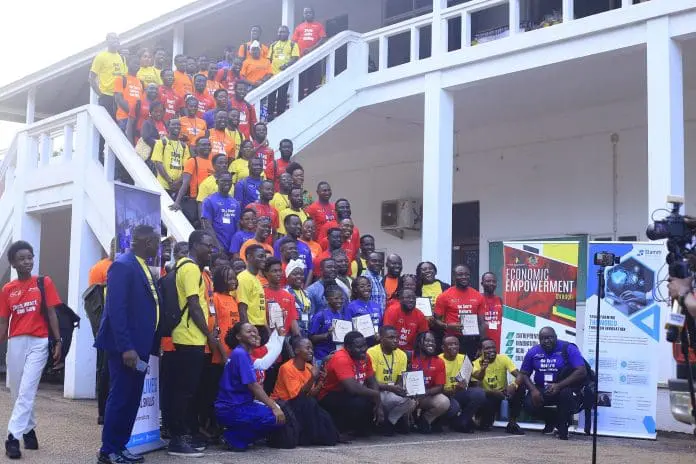Copyright ghanamma

Over 120 young people completed a week-long cybersecurity training programme in Kumasi as part of an ambitious campaign by Slamm Foundation to equip one million Ghanaians with digital skills over the next decade. The training, organized in partnership with the Ashanti Regional Coordinating Council and the National Youth Authority, covered cybersecurity monitoring, basic networking, IT audit, digital forensics and investigative tools. Participants received practical instruction aimed at preparing them for entry-level positions in Ghana’s expanding digital security sector. Dr. Samuel Boateng, CEO of Slamm Foundation, said the initiative builds on 25 years of accumulated cybersecurity knowledge that he and his wife Francisca Boateng decided to share through structured training programmes. Since launching Slamm Technology in 2007 and intensifying training efforts over the past five years, the foundation claims to have trained more than 200,000 young people across Ghana. The timing aligns with global Cybersecurity Awareness Month and responds to growing concerns about digital security as more Ghanaians conduct financial transactions online. One participant, Fathia Chindo Yahaya, said the training gave her confidence to help women in her community, particularly market traders, protect their financial accounts through stronger password practices. Samuel Twum, Deputy Director of Administration at the Ashanti Regional Coordinating Council, described the training as timely given rising cybersecurity challenges accompanying Ghana’s digital transformation. He praised the hands-on approach that combined theoretical concepts with practical demonstrations, though whether participants will find actual employment in the cybersecurity field remains uncertain. The job market for cybersecurity professionals in Ghana faces a mismatch between the number of people receiving basic training and the relatively limited positions available at companies and government agencies. While international organizations estimate Africa needs millions of additional cybersecurity workers, most entry-level trainees struggle to find employers willing to hire candidates without extensive experience. George Owel Amponsah, Ashanti Regional Director of the National Youth Authority, acknowledged this challenge by encouraging participants to begin through voluntary service, internships and mentorship rather than expecting immediate paid positions. The NYA pledged to help connect graduates with firms offering internship opportunities, though the success rate of such placements typically depends on economic conditions and employer demand. Francisca Boateng emphasized the foundation’s commitment to providing post-training support, including virtual learning, certification preparation, resume writing and interview skills development. That extended assistance could prove crucial, as basic cybersecurity training alone rarely qualifies candidates for competitive positions without additional credentials and practical experience. Ghana implemented mandatory licensing for cybersecurity professionals in March 2023 under the Cybersecurity Act 2020, requiring anyone working in the field to obtain official accreditation. Participants in approved training programmes like Slamm’s can use completion certificates as one step toward meeting licensing requirements, though additional qualifications are typically necessary. The foundation’s goal of training one million people over ten years would represent a significant expansion of Ghana’s digital skills base, assuming the quality and relevance of instruction keeps pace with rapidly evolving cybersecurity threats and technologies. Whether the labour market can absorb that many newly trained workers, and whether basic training translates into sustainable careers, will determine the programme’s long-term impact beyond the immediate educational benefits.



